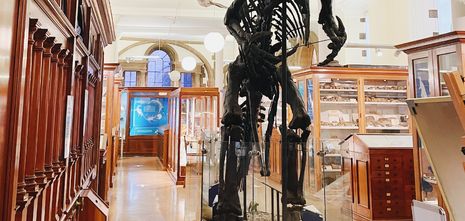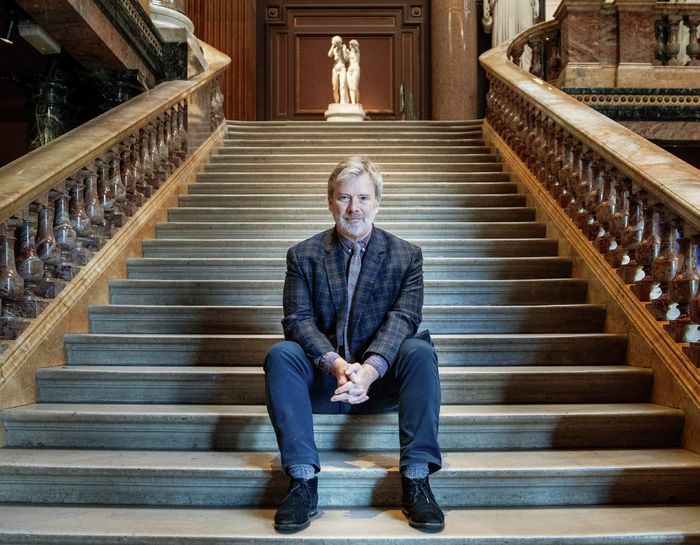‘Every aspect of museums is affected by colonialism’, say the Decolonise Cambridge Museums founders
Marion Willingham speaks to Anna Freed and Rosalind Phillips-Solomon, founders of the Decolonise Cambridge Museums Society, about the past, present and future of the university museums

As widespread attention to the Black Lives Matter movement raised calls for institutions to address their connections to empire and slavery, the University of Cambridge was a prime target. Many societies designed to ‘decolonise’ curricula were founded or revitalised, controversial windows were removed, and the University of Cambridge Museums (UCM) publicly declared their commitment to decolonisation.
At least partially responsible for this last development was the work of Rosalind Phillips-Solomon and Anna Freed, two of the three founders of the Decolonise Cambridge Museums society, launched in October 2021.
“During the wave of momentum for the BLM movement over the summer of 2020, I remember seeing a statement put out by the Universty of Cambridge Museums (UCM),” says Rosalind. This was “A commitment to change”, released on the 5th of June 2020. “I hadn’t found it quite satisfactory”, she adds.
At the time, she, alongside Anna and others from the Decolonise History of Art and Decolonise Archaeology initiatives, articulated this dissatisfaction in an open letter. The letter demanded that UCM take a more proactive and transparent approach to addressing their colonial histories.
“After the open letter, Anna, myself, and another friend ended up continuing this correspondence with UCM, and having meetings. We’d both come from different ‘decolonise’ groups, but we realised we were our own little group.” They joined forces with their third founding member, established a constitution, and the unofficial ‘UCM writers’ became Decolonise Cambridge Museums.
“What, exactly, is ‘decolonisation’?” I ask. “Essentially, it’s about addressing a colonial dynamic and the ways that manifests in museums,” says Rosalind. “Every aspect of museums is affected by colonialism,” adds Anna, mentioning that current staffing inequalities are just as relevant as the histories of the collections.
“Decolonising is about a fundamental restructuring of museums.” Rosalind highlights the relationships between museums and source communities, saying: “There’s a need for less paternalism and more respect for different systems of knowledge.”
“It’s about a fundamental restructuring of museums”
As for the collections, Rosalind remarks that: “A lot of people would assume that we’re really focused on repatriation – but decolonising museums also relates to honest, respectful and appropriate labelling. Sometimes there’s a need for changes to display – what should and shouldn’t be on display – and then yes, in some cases, repatriation.”
We start with the museums that Rosalind and Anna, as an art historian and archaeologist respectively, have less expertise on. “And that’s why we’re getting people involved, because we don’t know exactly what’s going on in these museums,” says Rosalind. “I know, for example in the Zoology Museum, some of those specimens may have been collected on colonial voyages, and there’s also the history of racism within science.”
Anna continues our whistle stop tour of the museums. “Obviously as an archaeologist the Museum of Archaeology and Anthropology (MAA) is the big one for me, and it’s one of the most obvious [...] it has Benin Bronzes taken in 1897; it has ethnographic collections.”
“The Fitzwilliam is more of the art history museum – but again colonialism affects the collecting within these museums, what gets included, what was considered art and what was considered archaeology and anthropology.”
The two also acknowledge that the Fitzwilliam has some more tangible links to slavery and empire, such as holding objects from Beijing’s Old Summer Palace, ransacked by British and French troops in 1860 and is now a subject of heated debate.
The significance of the last two museums, the Museum of Classical Archaeology and the 20th-Century art gallery Kettle’s Yard, is less obvious. “Kettle’s Yard is interesting,” says Rosalind. “
I think it is definitely relevant because a lot of 20th century artists were really interested in ethnographic collections, and often engaged with some of these objects in quite problematic ways. It’s something that should be interrogated by students of modern art.”
I ask what progress the museums have made so far. Anna begins: “Probably the biggest initiative, especially across museums, is the legacies of slavery work.” This involves a UCM-wide investigation into links with slavery, and the curation of an exhibition on the topic. Rosalind mentions an existing exhibition at the MAA called ‘[Re:] Entanglements: Colonial collections in decolonial times’.
They also discuss the sparked interest in repatriation in Cambridge since the repatriation of Jesus College’s Benin Bronze. They point to the MAA’s statements in response to this as a suggestion that work on this issue is happening behind the scenes.
“What is right is what is needed for the source community”
“We’re very passionate about this but we can’t dictate what is or isn’t right for a particular object, because what is right is what is needed for the source community, to address the harm that’s been caused in the way that the museums have interacted with them and their objects.” Anna continues: “I think it involves diaspora communities and BIPOC students as well.”
So how do they envision museums of the future? Anna notes that: “Museums will always have historic objects that were ethically sourced [...] and I have always thought that it’s the job of a curator to make those mundane, less flashy artefacts more interesting to the public.”
Rosalind underlines that the future of museums rests not only on what’s in them, but who controls them. “The involvement of source communities and people from the diaspora is central to the evolution of museums.”
 News / Hundreds of Cambridge academics demand vote on fate of vet course20 February 2026
News / Hundreds of Cambridge academics demand vote on fate of vet course20 February 2026 News / University Council rescinds University Centre membership20 February 2026
News / University Council rescinds University Centre membership20 February 2026 News / Judge Business School advisor resigns over Epstein and Andrew links18 February 2026
News / Judge Business School advisor resigns over Epstein and Andrew links18 February 2026 News / Petition demands University reverse decision on vegan menu20 February 2026
News / Petition demands University reverse decision on vegan menu20 February 2026 News / Caius students fail to pass Pride flag proposal20 February 2026
News / Caius students fail to pass Pride flag proposal20 February 2026










